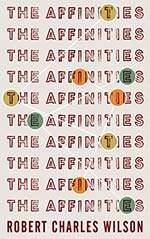
![]() MMOGC
MMOGC
5/12/2015
![]()
My thoughts on The Affinities in a nutshell: Loved loved loved the idea, but not so keen on the execution. Social science fiction is an enjoyable subgenre for me, but when the socio-political part of that equation gets lost in the narrative, I confess having trouble getting into the story. Nevertheless, there are a lot of interesting themes in here, many of which can be gleaned from the general description of the novel itself.
The book begins with an introduction to our narrator, Adam Fisk. At loose ends with his life and career, one day he decides to sign up for Affinity testing, the newfangled social phenomenon that has taken the continent by storm. That decision will change his life forever. Adam's results ends up qualifying him for entrance into the Tau Affinity, one of twenty-two exclusive social groups whose membership is determined by a complex battery of personality tests. Tau becomes Adam's new family. His fellow members don't need to know him to understand him or to be his friend; they're all Tau too. It's "Tau telepathy", everybody just gets everybody else.
Yet as the years go by and Affinities become more entrenched in our societies, new problems start to manifest themselves. The people in the twenty-two Affinities are happy with their new friends and new lives, but what of the people who don't want to join an Affinity or whose tests don't qualify them for any of them? And because members within an Affinity are so adept at working with each other, it is inevitable that the bigger and more influential Affinities begin to accumulate real political and financial power - Affinities like Tau and Het, whose differences eventually lead them to war against each other.
It's all very fascinating, and indeed, I enjoyed the first hundred pages or so of the book immensely. Alas, around the halfway mark is when things started unraveling. While I liked the concept of Affinities, we don't get near enough of the science or technology behind it. I felt like I was expected to just roll with the punches, ignore the implausibilities and just move on, so to speak. Which would have been fine with me if the story had been more satisfying on the social commentary front. But it wasn't either, not particularly. With regards to the book's topics, it felt like the author was biting off more than he could chew, resulting in limited implementation of the main idea when its potential in fact demands so much more. While reading The Affinities, I frequently caught the sense of the story crying out, begging to be a lot bigger, but it nonetheless fails to break out of the superficial plot that confines it.
Granted, writing stories that explore human behavior is always tricky. What Wilson endeavored to do here is admirable, but in the end I think the concept he put forward was treated too simplistically. Perhaps this is because we only focus on a single affinity, Tau, and didn't get to see much of what happens within the others. I didn't feel much of the "affinity-sympathy" between members of Tau, and instead felt more of the differences between the people associated with Affinities versus those who were not. The first group unfortunately came across as a bunch of insouciant, promiscuous pot-smoking shallow snobs, while those against the Affinities were portrayed as stuffy, bigoted, corporate-machine-loving ignorant right-wingers (most notably illustrated by Adam's family). I don't think this was the point of the novel, but that was a strong impression it gave off. Our main protagonist is neither of these two extremes but ends up being a rather passive entity caught in the middle, which in some ways made his character even more irksome.
Perhaps what excited me most about this novel was its setting. Toronto is my hometown and I loved that Robert Charles Wilson (who resides there) did it plenty of justice by illustrating what a vibrant city it is, made up of diverse neighborhoods filled with diverse people. It is also Canada's largest city and economic powerhouse. Arguably, its qualities make it the perfect milieu for stories like The Affinities to take place, because it has all the necessary ingredients.
In the end, I don't want to sound overly critical or make you think that I didn't enjoy the book, because I did. There is a very interesting story here; when I wasn't frustrated by it, I actually really liked it. Notably, the plot picked up again in Part Three as Tau wages war with their rival, Het Affinity. It becomes a more direct and intimate story at that point, bringing suspense and even a few thrills into the picture. Unfortunately though, whatever comment this book hoped to make about society was lost in the hustle and bustle. Still, there are many things this book does right, and it's worth reading.
http://bibliosanctum.com/2015/04/28/book-review-the-affinities-by-robert-charles-wilson/